As we look to the new year of 2022, to say 2021 was a high impact news year in the world of politics would be an understatement. Without a doubt, the biggest headline in the past year has been the ongoing coronavirus pandemic, which has disproportionately impacted Black and Brown communities.
To date, Black Americans are nearly three times more likely to be hospitalized and nearly two times more likely to die from COVID-19, according to the CDC.
This year we saw the United States make strides in vaccinating Americans, but also faced challenges as seen in recent weeks as the nation grapples with the omicron and delta variants. Just this week, the cases in the United States hit a record high since last winter.
As lead researcher for the Moderna vaccine, Dr. Kizzmekia Corbett, told theGrio in November “it is not if but when” everyone will inevitably be infected with the disease.
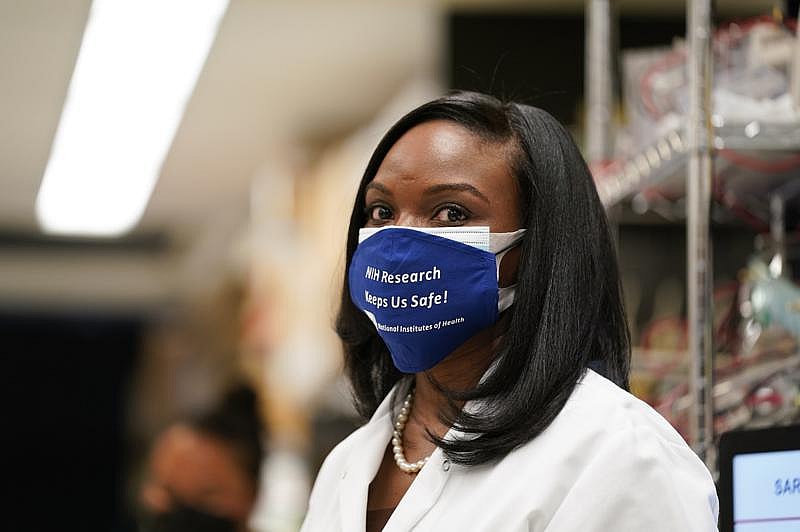
The push for vaccinations and boosters escalated from the highest levels. By the end of the year, boosters and vaccinations were made available to most Americans, including children starting at age 5. The federal government had not yet mandated immunization nationwide, but did require vaccinations for federal workers. Businesses with 100 employees or more were also ordered by the Biden administration to require their workers to be vaccinated or produce a negative test result weekly.
To date, 62% of Americans have been fully vaccinated, according to CDC data, but not nearly has much as President Biden and his administration had hoped.
The unvaccinated are still considered a major hurdle in combating the continued spread of the deadly virus. By the end of 2021, there was even a surprise endorsement from former President Donald Trump, who changed his stance on vaccinations.
The potential 2024 Republican presidential candidate told right-wing Black conservative Candace Owens that “the vaccines work,” adding “the ones who get very sick and go to the hospital are the ones that don’t take the vaccine. But it’s still their choice. And if you take the vaccine, you’re protected.”
Speaking of Trump, the Capitol insurrection on Jan. 6 believed to be incited by the former president also dominated the news cycle in 2021. During the now infamous Capitol attack, congressional leaders were led to safety while running for cover as followers of then President Trump waged war on the legislative branch of government. Thousands broke into the Capitol building looking for leaders like House Speaker Nancy Pelosi and then Vice President Mike Pence.
The visuals cannot be unseen as Trump supporters erected a noose hanging from a gallows as they destroyed the nation’s Capitol in an attempt to stop the presidential election from being certified by the Electoral College in favor of the newly elected president, Joe Biden, and America’s first Black and South Asian woman vice president Kamala Harris.
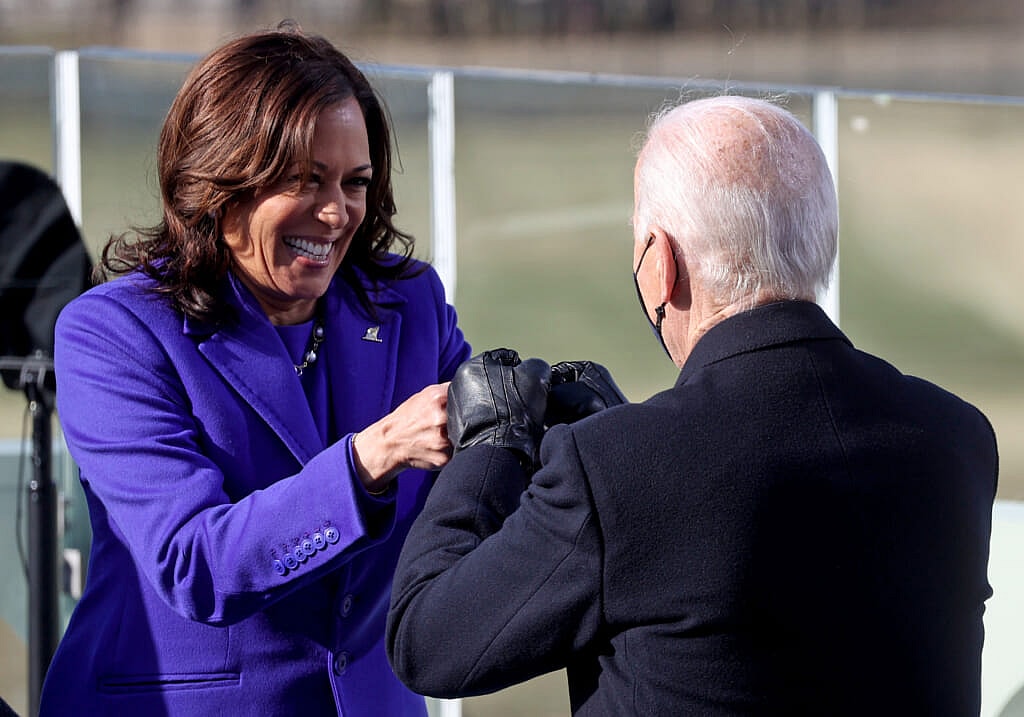
Lonnie Bunch, the first African American secretary of the Smithsonian Institution, called the terrorist attack “a day of infamy.”
Insurrectionists also desecrated the memorial of late Congressman John R. Lewis and spread feces on the walls of Congress along with other unthinkable acts. Now special interest groups that funded the gatherings that led up to the insurrection are being investigated by the U.S. House select committee commissioned by Speaker Pelosi, who broke the news of the committee’s formation with theGrio earlier this year.
Days before the attack, theGrio talked exclusively with U.S. Congresswoman Maxine Waters about her concerns over Jan. 6 ahead of the planned march that eventually turned violent. The California congresswoman described how she had questioned Speaker Pelosi and Capitol Police on the safety precautions for that day. The then Capitol Police leadership in that meeting told Waters that they were prepared for what was to come. History, however, proves otherwise.

Weeks later into the month of January 2021, security gates guarded by military officers surrounded the Capitol building for the ceremonious peaceful transition of power as outgoing President Trump dragged his feet to leave his seat of power at the White House. History was ultimately made on Jan. 20 as President Biden and Vice President Harris were officially inaugurated as the nation’s new leadership.
As the first woman and woman of color to serve as vice president, Harris held an honorable and almost celebrity-like status that failed to sustain throughout 2021 as her approval rating dropped to 28% in a poll conducted by USA Today/Suffolk University.
Harris saw an attack on her credibility from the press, particularly conservative media, from within the White House, and even from disgruntled Democrats. And by the end of the year, two high-profile Black women in the Harris press office, Ashley Etienne and Symone Sanders, had resigned from their positions.

Despite the political beatings the Biden-Harris administration took from time to time in its first 11 months in office, throughout the year the White House leaned in on America’s racial history and vowed to center race and equity in all of its executive and legislative work.
In June, President Biden traveled to Tulsa, Oklahoma for the 100th anniversary of the deadly race massacre in the Greenwood District once known as Black Wall Street. The president spoke of the atrocity of the event in which angry White residents destroyed the thriving Black community that spanned 40 city blocks.
The speech in Tulsa laid the groundwork for the national conversation led by U.S. Transportation Secretary Pete Buttigieg about deconstructing racism in the nation’s roadways.
Funding from Biden’s infrastructure plan, which was signed into law in November, has been earmarked to address the intentional racism that was in mind when developing and building the nation’s interstates and highways in the 1950s. As theGrio reported earlier in December, the onus is left to state and local officials to determine if and how they will undertake the heavy lift to redress the infrastructure racism that has for decades isolated and caused harm to Black communities.
Throughout the year there were stumbling blocks on major issues impacting Black America, voting rights and police reform, as well as Biden’s Build Back Better (BBB) plan that included social programs like the extension of the child tax credit.
On policing, Black Republican U.S. Senator Tim Scott torpedoed the George Floyd Justice In Policing Act after months of work to come up with a bipartisan compromise between him and Democratic U.S. Senator Cory Booker of New Jersey and U.S. Congresswoman Karen Bass of California.
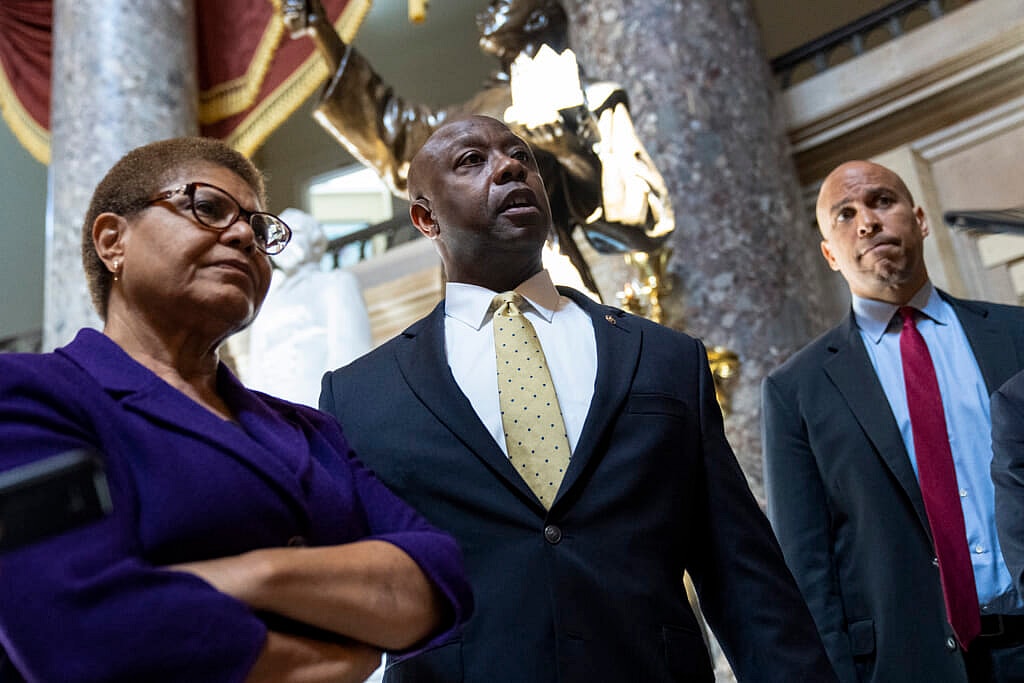
Some Democrats believed that Scott never worked in good faith to achieve police reform, despite support for reform from police unions. After all, naysayers pointed out, this was the same Senator Scott who said in his GOP rebuttal response to President Biden’s Joint Address to Congress that “America is not racist” – this after millions marched in 2020 in protest of racist police brutality following the police killings of George Floyd, Breonna Taylor and other unarmed Black Americans.
The White House hosted Floyd’s family in May on the anniversary of his murder. President Biden, however, had fallen short of his promise to sign the George Floyd bill into law by the anniversary of his death.
As the year ended the Biden administration has been working on what they could do to expedite some sort of response to police reform through executive orders. The administration is working in conjunction with civil rights leaders and attorneys who contend the hoped-for executive orders won’t have the same teeth as a law passed by Congress.
2021 was also a year of high-profile and consequential verdicts involving police and civilian-involved homicides — all of which was connected in some fashion to the nation’s policing issue that was magnified by the Black Lives Matter movement.

White House officials were said to be glued to a television set in the west wing while they watched the verdict in the trial of former Minneapolis police officer Derek Chauvin, who was found guilty on June 25 in the murder George Floyd.
In another controversial trial, President Biden weighed in on the Nov. 19 verdict that found Kyle Rittenhouse, 18, not guilty in the fatal shootings of two men (and wounding of another) following Black Lives Matters protests in Kenosha, Wisconsin. The president stunned Black activists in his comments following Rittenhouse’s acquittal in which he said “the jury system works.”
Just days later, there was another highly-anticipated verdict in the fatal shooting of Ahmaud Arbery, the 25-year-old unarmed Black man who was jogging in a predominantly White neighborhood in Brunswick, Georgia.

After Gregory McMichael, Travis McMichael and William “Roddie” Bryan were found guilty of felony murder, President Biden delivered a more explicit statement on the role of race in the criminal justice system.
“While the guilty verdicts reflect our justice system doing its job, that alone is not enough,” Biden said in a written statement. “Instead, we must recommit ourselves to building a future of unity and shared strength, where no one fears violence because of the color of their skin.”
Adding to the list of high-profile criminal cases involving Black shooting victims, two days before Christmas Day a jury found former police officer Kim Potter guilty of manslaughter for using a gun instead of her taser when she shot and killed 20-year-old Daunte Wright.
President Biden also faced significant challenges trying to pass key legislative agenda items through his trillion-dollar social spending package known as Build Back Better. The main roadblocks to passing the bill were members of his own party: Senator Krysten Sinema of Arizona and Senator Joe Manchin of West Virginia.
Despite Manchin essentially killing the bill after announcing on Fox News that he would not vote in favor of BBB, President Biden still thinks there’s a possibility that Democrats could get it passed in a “good faith deal.”
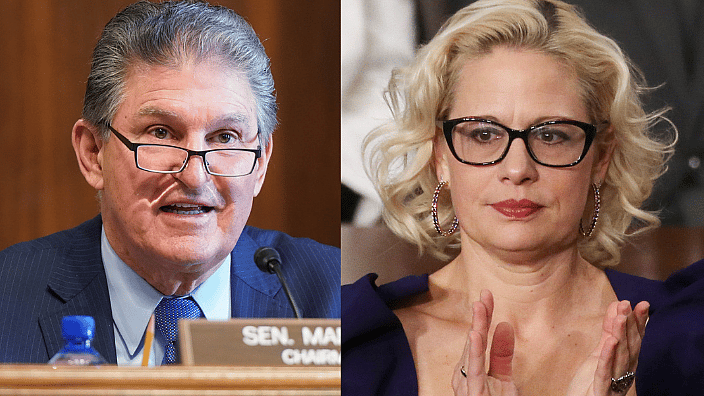
Manchin delivered his fair share of no’s to the Biden and Democratic agenda in 2021. The moderate Democrat also held up passage of voting rights reform in the Senate, despite being passed by his Democratic colleagues in the U.S. House of Representatives. Not to mention, both Manchin and President Biden indicated they were not willing to eliminate the Senate filibuster to bypass Republican opposition and pass critical voting rights legislation.
The president, however, changed his tune during a CNN town hall in Baltimore, Maryland, where he said he would work with Democrats on the filibuster to address nationwide bills that stand to weaken access to the ballot in Republican-controlled states like Texas and Georgia – but only after he signed the Infrastructure and Jobs Investment Act into law.
As Biden and Democrats in the Senate engaged in political caution as it related to voting rights, theGrio led on voting rights coverage as activists and members of the Congressional Black Caucus (CBC) worked to pressure the White House and Congress to act and keep the issue top of mind for the American public.
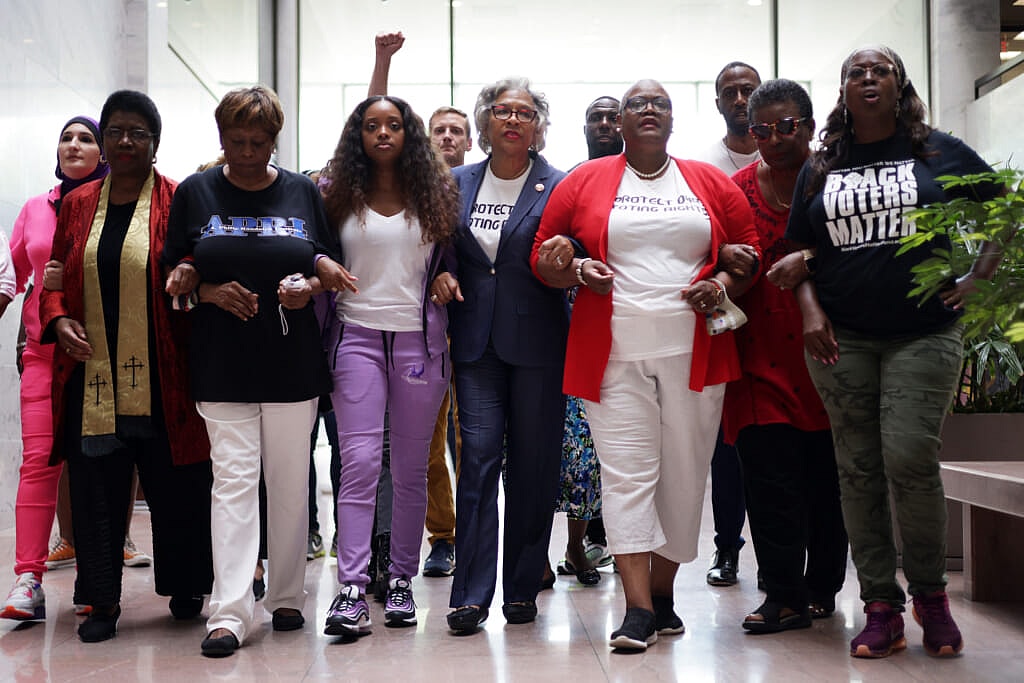
Demonstrations throughout the year in Washington, D.C. saw the prominent arrests of CBC Chair U.S. Rep. Joyce Beatty, U.S. Reps. Sheila Jackson Lee, Al Green and Hank Johnson, and civil rights activists Rev. Jesse Jackson Sr., Martin Luther King III, Ben Jealous and actress Alyssa Milano. Sirius XM radio host and activist Joe Madison also joined the nationwide protests with a solid food hunger strike until Congress passes voting rights legislation.
President Biden has since leaned all the way in on voting rights, declaring it the “single-biggest issue” for the nation and vowed to work with Democrats to address it, including reforming the filibuster if necessary.
As it relates to education, HBCUs received record funding from Congress, though President Biden had pushed for more. That as Howard University saw its reputation and its mold-infested dorm rooms exposed for the public to see. Rev. Jesse Jackson was one of the major names working to broker a deal in the month-long standoff between students and the university.

However, what astonished many was the revelation on The Breakfast Club in an interview with Department of Education Secretary Miguel Cordona, who admitted he was oblivious to the protests on the Howard campus that is less than 3 miles away from his office in D.C.
The White House also found itself defending against accusations of discrimination and inhumane treatment of Black and Brown migrants at the U.S. border. The matter became a national issue after images surfaced of U.S. Border Patrol agents on horses whipping Haitian migrants with horse reins in Del Rio, Texas. The migrants had traveled from South America in search of a new home in the midst of extreme crises in Haiti, including the assassination of its president, gang violence and a deadly earthquake.
White House officials pushed back against advocacy groups who accused the administration of discrimination in its deportation of Haitian immigrants compared to migrants from other nations who sought asylum in the United States.

White House Press Secretary Jen Psaki solemnly said from the press briefing room in response to a question posed by theGrio that the administration’s “immigration policy is not about one country or discriminating against one country over another. We want to put an end to that and what we saw over the last four years.”
But despite the United States bringing Afghans who supported the U.S. military’s 20-year war against the Taliban in Afghanistan into the country, as well as Mexican migrants being processed by Immigration and Naturalization Services (INS), Haitians were sent back on planes immediately after the Border Patrol’s treatment of Haitian migrants was exposed.
What’s more, deportation flights containing Haitian and African migrants under the public health law, Title 42, continued well into the latter part of 2021.
Now the administration and members of Congress look ahead to 2022, where there will be crucial elections that will determine the future leadership in Washington and governorships across the country.
One of those major elections will be the race for governor of Georgia. Political superstar Stacey Abrams, who came extremely close to becoming the state’s first Black woman governor (and the first in the nation) in 2018 announced on Dec. 1 that she will run again in 2022.

Georgia is also the state where former president Donald Trump lost to Biden in a political upset that ultimately led to his false claims of voter fraud and the subsequent Capitol insurrection.
Abrams’s voter registration activism through her organization Fair Fight has been largely credited for the major turnout among Democratic voters, specifically Black and Brown, who made the difference in the 2020 election. Abrams hopes to capitalize on that momentum, but not without a fight from Republicans and Trump, who is determined to flip Georgia back to red.
Trump has since endorsed the former U.S. Senator David Perdue as his preferred Republican candidate to run against Abrams. Trump publicly blasted current Republican Georgia Gov. Brian Kemp after he refused to play a role in Trump’s attempt to reverse the state’s 2020 presidential election results.
With this political backdrop, the battle ahead in 2022 will be one to watch.
Have you subscribed to theGrio podcasts “Dear Culture” or “Acting Up?” Download our newest episodes now!
TheGrio is now on Apple TV, Amazon Fire and Roku. Download theGrio.com today!


